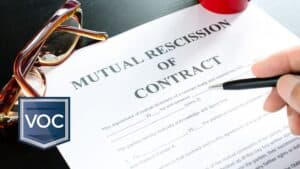Last week, we talked about some of the digital voices that essentially keep frustrated timeshare owners from finding relief. Since the industry hasn’t exactly been built on trustworthiness, the public (in general) isn’t really sure what to make of timeshare travel. This opens up the door for the loudest opinions to be heard the most. But before you get suckered into believing in bias timeshare guidance, you have to be able to understand who’s telling you this information and why they’re motivated to promote it.
Keyboard warriors have been and will continue to be a problem online. Outside of flagging comments and statements you know are false, there isn’t much you can do to combat their digital activity. It’s nearly impossible to muzzle freedom of speech on a platform that’s already proven difficult to censor and regulate. Punishing people for being arrogant jerks isn’t exactly feasible. The more you get worked up about their opinion, the more they gloat in the simple fact you can’t touch them.
So before we discuss why these people feel the need to argue about things they don’t understand, we need to pose a question. If you’ve ever found yourself frustrated by someone spewing inaccurate information on social media, why would you ever consider bias timeshare guidance that’s randomly posted online? Although some of the claims we covered last week may sound promising, you should know that most online users are not experts. Especially vague accounts that claim to have “hacks” or inside information. Before you get too emotionally involved in something you read online, take a second to acknowledge this.

Timeshare Travel Lacks Trustworthy Guidance.
While there are some credible online resources, nearly everything is opinion-based. The most intelligent thing you can do is take everything you read with a grain of salt until you’re able to validate the idea or solution yourself. When it comes to owning a timeshare, this should be your only approach. Nearly all industry communication is hearsay, sales or bias timeshare guidance that lacks factual support. A majority of timeshare companies make a living off of credibility claims and promised guarantees. Even the resort itself knows how to strategically collect more money from buyers.
If most operations are questionable, how can anyone believe an individual user? Just because you can relate to what they’re saying doesn’t mean it’s true. Either way, not knowing what’s real and what’s a sale can be absolutely maddening for those looking to get rid of a timeshare contract. This is why exposing scams and challenging those pretending to be pro-consumer is a priority of ours. Keyboard warriors can influence owners to make irrational decisions and certain people have no business advising timeshare owners.
In the end, we’d like to be seen as a consistent resource that people can trust for honest timeshare guidance. Whether buyers use VOC to cancel ownership or not, they deserve some sort of transparency after spending tens of thousands of dollars on something they don’t value. So let’s take a second to analyze the motives behind those encouraging timeshare owners to make bad decisions.

Who Is Typing Bias Timeshare Guidance and Why?
Unfortunately, our society is full of people that claim to know anything about everything they’ve taken an interest in. Today, anyone can easily find an opinionated article supporting an idea that means something to them. This is dangerous in the timeshare realm because most unhappy buyer surf the web for help. When an owner feels scammed by the resort and wants to walk away from the contract and its fees, some online user is always eager to reassure them this is a smart decision.
This type of influence leads people to believe they have nothing to worry about and that they’ve dodged because the timeshare is “all talk.” It may even discredit some of the logical or legal timeshare guidance they’ve already received. When buyers want to believe they can just dump their timeshare contract or stop paying maintenance fees, all they need is one bias person that shares this belief to encourage them. Over time, there have become so many published opinions about timeshares that the truth has become clouded at best. Here are some of the responsible parties.
1. Emotionally Driven Family Members.
If you happen to have younger siblings, you’ve probably had to stick up for one of them at some point in time. No matter the rhyme or reason, you have a sense of loyalty there that’s important to uphold. Often times, relatives of timeshare owners feel the need to stand up for the financial hardship their family member is enduring. Whether they feel the owner has been taken advantage of or that they’re more capable of finding resolve, they’re emotionally driven to hold someone accountable and spread the news.
The problem with this type of voice is the simple fact that they’re normally uneducated on the situation. We’ve talked to a number of family members over the years and most of them don’t even want to listen. All they know is their mom or brother or aunt has a lot of debt that they weren’t expecting. Most of the time this has to do with threats from the resort. While their anger might be warranted in most cases, they have no business providing bias timeshare guidance when their family member fails to find resolve.

At this point, most affiliated parties simply want to blow off some steam or do what they can to punish somebody for the inconvenience. The social media comments we shared in last week’s article show just how erratic some people can be. Most are based on other exit company’s incompetence. Others are predicated on assumptions that derive from the expectation that the family member will continue getting screwed.
Understanding that some of the comments you read online are nothing more than emotional tantrums by motivated parties can save you from going down rabbit holes that’ll never be fruitful.
2. Angry Consumers With Bad Experiences.
While family and close friends tend to carry a lot of bias, some people have been lied to so much that they literally expect nothing but the worst. This tends to happen when a timeshare owner experiences misconduct on every level of their purchase. Because they didn’t make smart decisions throughout, they assume everything is bad. Since they’re unable to improve their current situation, they spend a lot of time seeking company for their misery.
Without much purpose at all, they hover message boards and social media waiting for an opportunity to rain on someone’s parade. Once they’ve been misled by the resort and scammed by a third party for relief, they tend to believe there is no hope at all. Sadly, their obvious frustration isn’t very encouraging to someone looking to legally cancel a timeshare. These types of people tend to passionately challenge and discredit even the most credible of solutions.

What ends up happening is, buyers get cold feet about cancellation and remain at the mercy of the resort. It’s a sad sight to see when a disgruntled buyer loses all hope because someone decided to vomit bias timeshare guidance. But relief isn’t always the focal point. Some online users persuade buyers to stop paying for the timeshare altogether. Unfortunately, the confidence behind these claims are almost always short lived. The timeshare eventually comes to collect dues and penalties.
3. Gullible Owners Littered with Optimism.
The last type of person you can expect to get bias timeshare guidance from is the deceived buyer. Like aforementioned, resorts are masters of persuasion. When something goes wrong or expectations aren’t met, they know how to charm buyers with ambiguous reassurances. Owners who believe the timeshare company is really in their corner usually boast about the purchase. While they may have initially felt slighted, they now have a reborn confidence in their decision.
When they come across message boards, social media posts or blogs that badmouth the timeshare, they feel obligated to stand up for the resort. In most cases, they’re still in denial. Even if the resort’s promises haven’t come into fruition, the owner will usually talk highly of the timeshare in order to remain optimistic. But they’re doing nothing more than reiterating hearsay. Trusting in bias timeshare guidance by hopeful buyers is ignorant because we know most industry guarantees exclude pertinent information.
All timeshare contracts are different. Some people are able to exit timeshare contracts through the resort once they’ve paid off their mortgage and a few years of maintenance fees. Some buyers have floating weeks or right to use intervals. Accepting what another user says to be true may not even be applicable to your situation. So if you’re not sure why they’re so confidently optimistic, you might want to dig a little deeper before joining their ingenious.

Approach the Internet With Skepticism Until You’re Sure.
While finding factual information on timeshare travel can be grueling, we want you to know the effort is worth it. Like most things, you can’t always believe what you hear. People can be pretty compelling online, but don’t let it guide your timeshare decisions. Owning a timeshare takes a lot of discipline if you want to stick within your budget. An ability to block out the influences and salesmen can go a long way.
Truth be told, plenty of consumers thoroughly enjoy their timeshare. But they take the time to research their options before investing in a purchase of this magnitude. The same can be said for avoiding timeshare exit fraud. The best way to eliminate any type of confusion is to go into a timeshare presentation prepared. When you allow someone to persuade you on something you’re not exactly interested in, the outcome is rarely favorable.
If you’ve bought and interval and need some help, do everything you can to identify and look passed bias timeshare guidance. For more information on our attorney based process, you can schedule a free consultation or proceed with the qualification form below.






